Unit 1 What's the matter Section A(3a-3c)课件(共31张PPT)人教版八年级下册
文档属性
| 名称 | Unit 1 What's the matter Section A(3a-3c)课件(共31张PPT)人教版八年级下册 |  | |
| 格式 | pptx | ||
| 文件大小 | 11.2MB | ||
| 资源类型 | 教案 | ||
| 版本资源 | 人教新目标(Go for it)版 | ||
| 科目 | 英语 | ||
| 更新时间 | 2025-05-31 13:25:32 | ||
图片预览

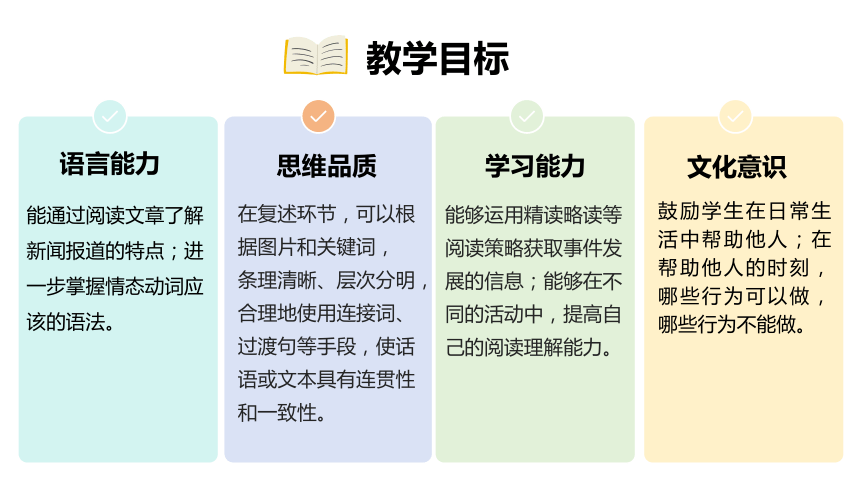

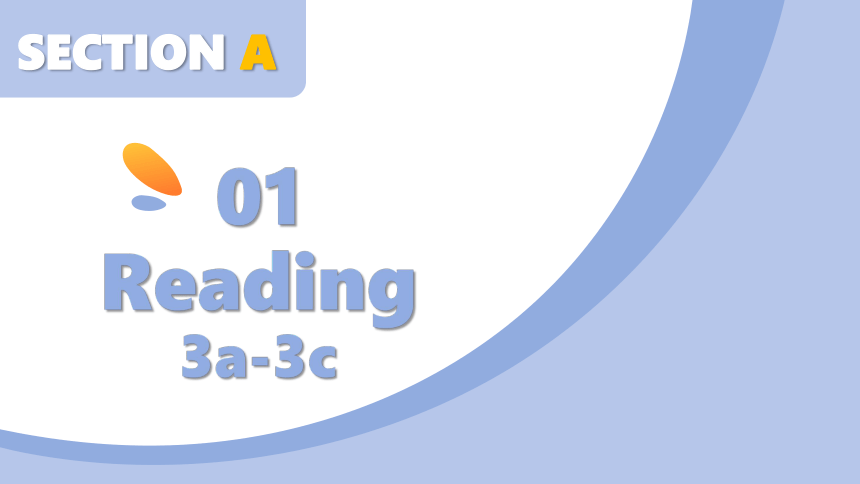

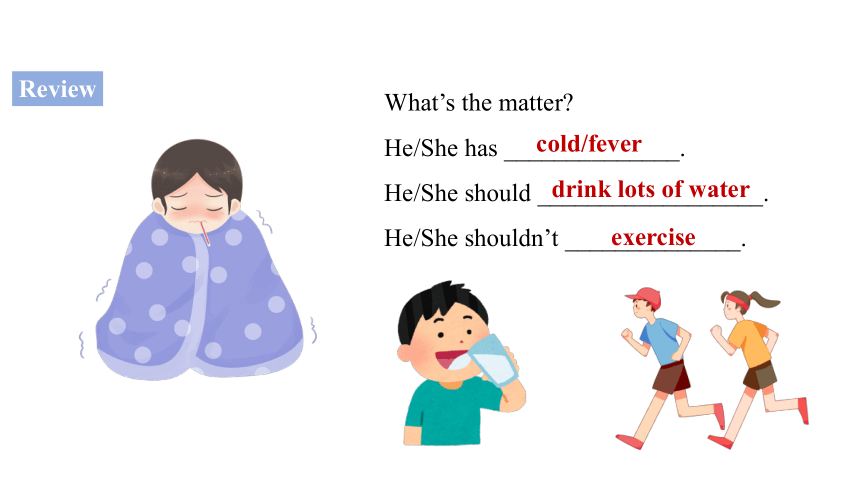


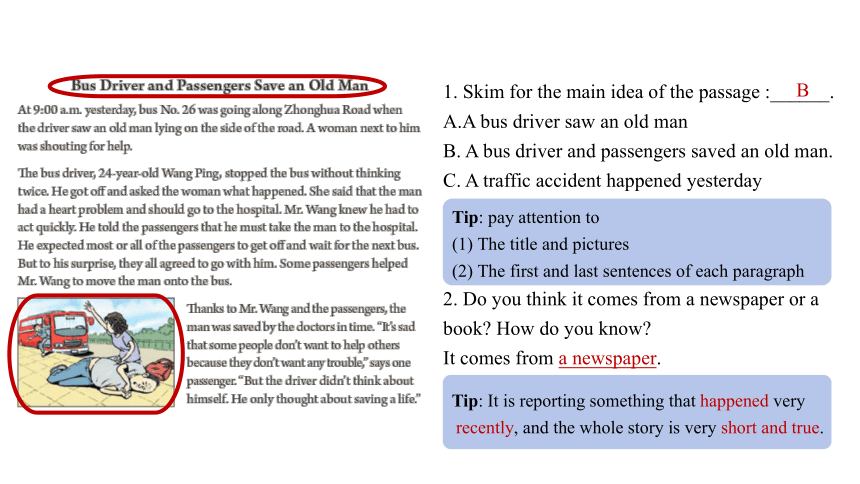
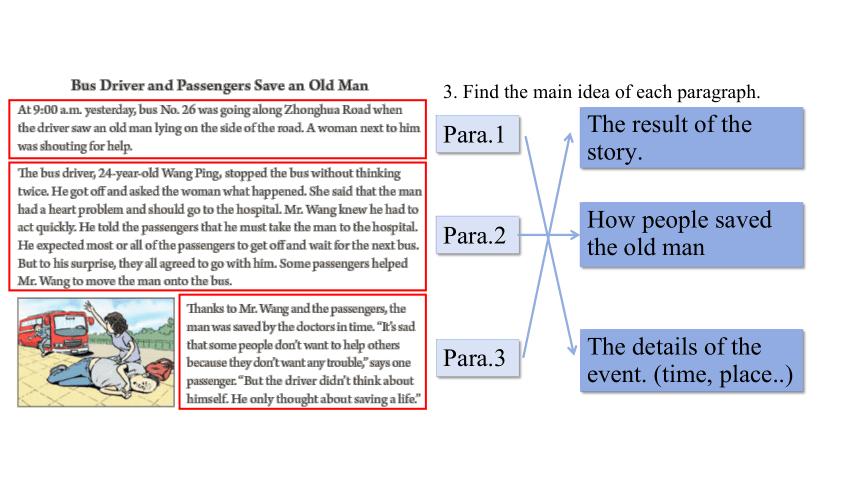
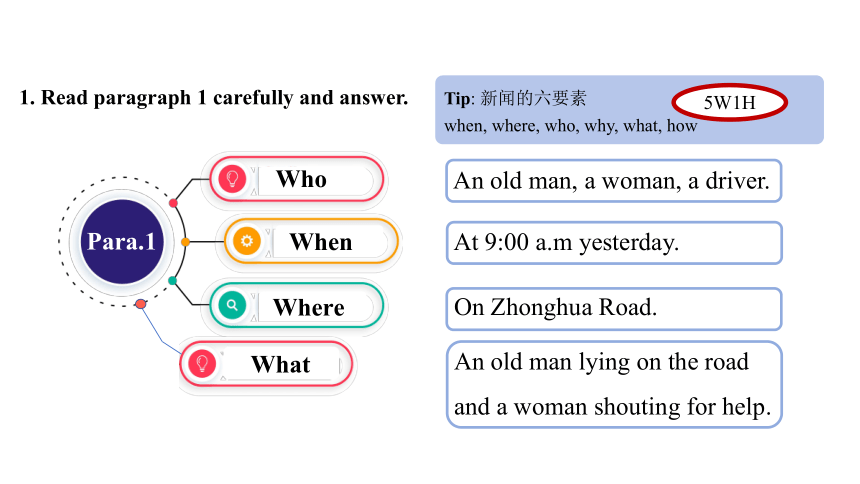
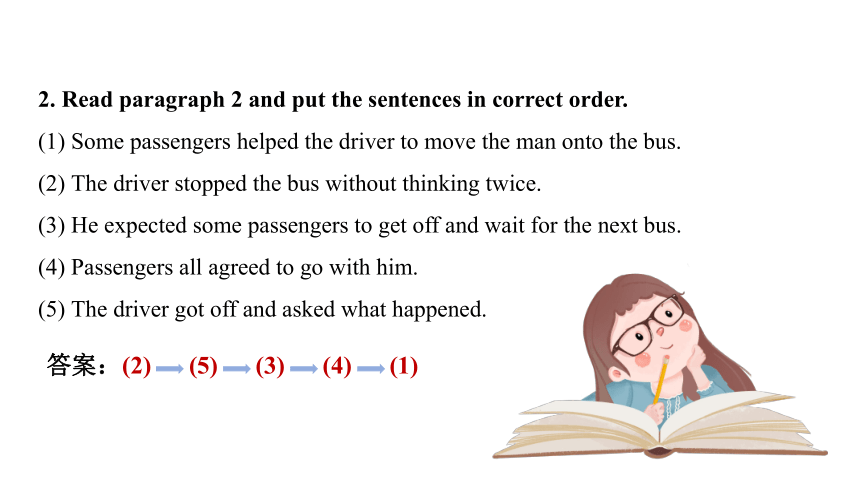
文档简介
(共31张PPT)
What's the matter
UNIT 1
Reading 3a-3c
思维品质
学习能力
文化意识
语言能力
教学目标
能通过阅读文章了解新闻报道的特点;进一步掌握情态动词应该的语法。
能够运用精读略读等阅读策略获取事件发展的信息;能够在不同的活动中,提高自己的阅读理解能力。
鼓励学生在日常生活中帮助他人;在帮助他人的时刻,哪些行为可以做,哪些行为不能做。
在复述环节,可以根据图片和关键词,
条理清晰、层次分明,合理地使用连接词、过渡句等手段,使话语或文本具有连贯性和一致性。
能通过阅读文章了解新闻报道的特点;
能够通过不同的阅读活动,锻炼阅读理解与表达能力。
如何在引导学生进行不同任务,锻炼逻辑思维的合理性与连贯性;
如何鼓励学生在日常生活中帮助他人。
01
02
教学重难点
01
Reading
3a-3c
SECTION A
Lead-in
1
Review
What’s the matter
He/She has ______________.
He/She should ______________.
He/She shouldn’t ______________.
sore back
see a doctor
exercise
Lead-in
1
Review
What’s the matter
He/She has ______________.
He/She should __________________.
He/She shouldn’t ______________.
cold/fever
drink lots of water
exercise
Lead-in
1
Review
What’s the matter
He/She has ______________.
He/She should ____________________________.
He/She shouldn’t __________________________.
sore throat
drink some hot tea with honey
eat dry food such as cookies
Pre-reading
2
1. What’s the matter with the old man
An old man was lying on the side of road.
2. What’s the woman doing
A woman was shouting for help.
3. Who will save the old man
A young man was getting off the bus.
While-reading (Fast reading)
3
1. Skim for the main idea of the passage :______.
A.A bus driver saw an old man
B. A bus driver and passengers saved an old man.
C. A traffic accident happened yesterday
2. Do you think it comes from a newspaper or a book How do you know
It comes from a newspaper.
Tip: pay attention to
(1) The title and pictures
(2) The first and last sentences of each paragraph
B
Tip: It is reporting something that happened very
recently, and the whole story is very short and true.
3
3. Find the main idea of each paragraph.
How people saved the old man
The details of the event. (time, place..)
Para.1
Para.2
Para.3
The result of the story.
While-reading (Fast reading)
While-reading (Careful reading)
3
1. Read paragraph 1 carefully and answer.
Para.1
Who
When
Where
What
An old man, a woman, a driver.
At 9:00 a.m yesterday.
On Zhonghua Road.
An old man lying on the road and a woman shouting for help.
Tip: 新闻的六要素
when, where, who, why, what, how
5W1H
2. Read paragraph 2 and put the sentences in correct order.
(1) Some passengers helped the driver to move the man onto the bus.
(2) The driver stopped the bus without thinking twice.
(3) He expected some passengers to get off and wait for the next bus.
(4) Passengers all agreed to go with him.
(5) The driver got off and asked what happened.
答案:(2) (5) (3) (4) (1)
While-reading (Careful reading)
3
3. Read paragraph 3 carefully and answer.
(1) Why don’t many people want to help others
Thanks to Mr. Wang and the passengers, the man was saved by the doctors in time. ''It's said that many people don't want to help others because they don't want any trouble,''says one passenger. But the driver didn't think about himself. He only thought about saving a life.
(2) What do you think of the driver
He is kind, great, warm-hearted, selfless...
While-reading (Careful reading)
3
3b Read the passage again and check(√) the things that happened in the story.
While-reading (Careful reading)
3
1.___Wang Ping was the driver of bus No. 26 at 9:00 a.m. yesterday.
2.___Bus No.26 hit an old man on Zhonghua Road.
3.___The old man had a heart problem and needed to go to the hospital right away.
4.___The passengers on the bus didn't want to go to the hospital, so only Wang Ping went with the woman and old man.
5.___Some passengers helped to get the old man onto the bus.
6.___The old man got to the hospital in time.
√
√
√
√
Post-reading
4
1. Fill in the blanks according to the passage.
Wang Ping, a bus driver, was___________Zhonghua Road when he saw an old man ______ on the side of the road and a woman next to him_______________ . He stopped the bus without _____________. He ________and asked the woman what happened. She said that the man had a heart________ and ______ go to the hospital. Wang Ping told the passengers that he must _____ the man to the hospital. He _________ the passengers to get off and________ the next bus. But _____________, they all helped him move the man _____the bus. ___________these people, the man was saved_______.
going along
lying
shouting for help
thinking twice
got off
problem
should
take
expected
wait for
to his surprise
onto
Thanks to
in time
Post-reading
4
2. Retell the passage according to the pictures and key words.
shouted for help
stopped the bus without thinking twice
got off and asked...
told the bus driver...
told the passengers that...
expected the passengers to...
took the old man to the hospital
agreed to ...
helped ... to move...
helpful
Surprised!
Post-reading
4
3c Discuss the questions with a partner.
(1) Why was Wang Ping surprised that passengers agreed to go to the hospital with him
Because he thought that there were no passengers who agreed to go with him.
(2) Did the passengers think Wang Ping did the right thing How do you know
Yes, they did. Because they went with him together.
(3) Do you agree that people often do not help others because they don’t want to get
into trouble Why or why not
Yes, I do./ No, I don’t. Because …
Language Points!
1. ... when the driver saw an old man lying on the side of the road. ······这时司机看到一位老人正躺在路边。
see sb. doing sth. 看见某人正在做某事(强调动作正在进行)
see sb. do sth. 看见某人做了某事(目睹全过程或动作经常发生)
e.g. When I pass the window I see him drawing a picture.
当我经过窗户时,我看见他正在画画。
I see the boy play in the park every day.
我每天都看见那个男孩在公园里玩。
Language Points!
2. The bus driver, 24-year-old Wang Ping, stopped the bus without thinking twice. 公共汽车司机,24岁的王平,毫不犹豫地停下车。
think twice: 在做某事之前“认真思考;权衡利弊”(英语中一种固定的表述)
without doing sth.“没有做某事” ,其中without为介词,介词后通常接名词或动名词。
e.g. We must think twice before we make this decision!
在我们做出这个决定前,必须认真思考!
He left without saying goodbye.他不辞而别了。
Language Points!
3. But to his surprise, they all agreed to go with Him.但是使他惊讶的是,他们全部同意跟他一起去。
to one’s surprise 使……惊讶的是,出乎……意料
e.g. To their surprise, all the students pass the exam.
使他们惊讶的是,所有的学生都通过了考试。
Much to everyone’s surprise, the plan succeeded.
使每一个人非常惊讶的是,这个计划成功了。
Language Points!
4... because they don’t want any trouble, ······因为他们不想要任何困难
当trouble意为“困难;麻烦”时,是不可数名词。
e.g. I’m sorry to give you so much trouble. 很抱歉给你添了这么多麻烦。
拓展:
(1) be in trouble 意为“有困难;陷入困境”。
e.g. He always asks me for help when he is in trouble.
(2) get sb. into trouble 意为“使某人陷入困境”
e.g. If you come, you may get me into trouble.
Think and Say!
What can we do to help if we see someone faint or fall on the road some day
We can .......
① call 120
② call his family in time
③ ask adults for help
④ make sure you are safe
We’d better protect ourselves when helping others.
Think and Say!
What can’t we do when saving a fainted or a fallen person
pinch renzhong
shake the fainted person
pull the fallen person
move the fallen person without checking
These behaviors may cause the secondary injury for the person.
Will you help strangers when they are in trouble
Only if everyone gives a hand to people in need, can we get help when we are in trouble.
1. _____, the old man is his grandfather. He can’t believe it.
A. To his surprise B. Thanks to him
C. In his eyes D. As for him
2. I saw some boy students ________ basketball when I passed the playground.
A. played B. plays C. playing D. to play
3. ______, all of us agreed to go there with her.
A.To her surprise B.To her surprised C.To she surprise D.To she surprised
Exercise-单项选择
√
√
√
4. My brother has some ______ learning English. He can't understand grammar.
A.trouble B.interest
C.surprise D.opinion
5. —The population of the poor is getting smaller and smaller.
—______ the government, their living conditions have improved.
A.As for B.Thanks to
C.As a result of D.Thanks for
Exercise-单项选择
√
√
02
Summary
SECTION A
03
Homework
SECTION A
Homework
1. Write 3-5 sentences about the picture.
2. News report: Suppose you are the TV reporters, please write a piece of news in the group after class.
SEE YOU NEXT CLASS!
What's the matter
UNIT 1
Reading 3a-3c
思维品质
学习能力
文化意识
语言能力
教学目标
能通过阅读文章了解新闻报道的特点;进一步掌握情态动词应该的语法。
能够运用精读略读等阅读策略获取事件发展的信息;能够在不同的活动中,提高自己的阅读理解能力。
鼓励学生在日常生活中帮助他人;在帮助他人的时刻,哪些行为可以做,哪些行为不能做。
在复述环节,可以根据图片和关键词,
条理清晰、层次分明,合理地使用连接词、过渡句等手段,使话语或文本具有连贯性和一致性。
能通过阅读文章了解新闻报道的特点;
能够通过不同的阅读活动,锻炼阅读理解与表达能力。
如何在引导学生进行不同任务,锻炼逻辑思维的合理性与连贯性;
如何鼓励学生在日常生活中帮助他人。
01
02
教学重难点
01
Reading
3a-3c
SECTION A
Lead-in
1
Review
What’s the matter
He/She has ______________.
He/She should ______________.
He/She shouldn’t ______________.
sore back
see a doctor
exercise
Lead-in
1
Review
What’s the matter
He/She has ______________.
He/She should __________________.
He/She shouldn’t ______________.
cold/fever
drink lots of water
exercise
Lead-in
1
Review
What’s the matter
He/She has ______________.
He/She should ____________________________.
He/She shouldn’t __________________________.
sore throat
drink some hot tea with honey
eat dry food such as cookies
Pre-reading
2
1. What’s the matter with the old man
An old man was lying on the side of road.
2. What’s the woman doing
A woman was shouting for help.
3. Who will save the old man
A young man was getting off the bus.
While-reading (Fast reading)
3
1. Skim for the main idea of the passage :______.
A.A bus driver saw an old man
B. A bus driver and passengers saved an old man.
C. A traffic accident happened yesterday
2. Do you think it comes from a newspaper or a book How do you know
It comes from a newspaper.
Tip: pay attention to
(1) The title and pictures
(2) The first and last sentences of each paragraph
B
Tip: It is reporting something that happened very
recently, and the whole story is very short and true.
3
3. Find the main idea of each paragraph.
How people saved the old man
The details of the event. (time, place..)
Para.1
Para.2
Para.3
The result of the story.
While-reading (Fast reading)
While-reading (Careful reading)
3
1. Read paragraph 1 carefully and answer.
Para.1
Who
When
Where
What
An old man, a woman, a driver.
At 9:00 a.m yesterday.
On Zhonghua Road.
An old man lying on the road and a woman shouting for help.
Tip: 新闻的六要素
when, where, who, why, what, how
5W1H
2. Read paragraph 2 and put the sentences in correct order.
(1) Some passengers helped the driver to move the man onto the bus.
(2) The driver stopped the bus without thinking twice.
(3) He expected some passengers to get off and wait for the next bus.
(4) Passengers all agreed to go with him.
(5) The driver got off and asked what happened.
答案:(2) (5) (3) (4) (1)
While-reading (Careful reading)
3
3. Read paragraph 3 carefully and answer.
(1) Why don’t many people want to help others
Thanks to Mr. Wang and the passengers, the man was saved by the doctors in time. ''It's said that many people don't want to help others because they don't want any trouble,''says one passenger. But the driver didn't think about himself. He only thought about saving a life.
(2) What do you think of the driver
He is kind, great, warm-hearted, selfless...
While-reading (Careful reading)
3
3b Read the passage again and check(√) the things that happened in the story.
While-reading (Careful reading)
3
1.___Wang Ping was the driver of bus No. 26 at 9:00 a.m. yesterday.
2.___Bus No.26 hit an old man on Zhonghua Road.
3.___The old man had a heart problem and needed to go to the hospital right away.
4.___The passengers on the bus didn't want to go to the hospital, so only Wang Ping went with the woman and old man.
5.___Some passengers helped to get the old man onto the bus.
6.___The old man got to the hospital in time.
√
√
√
√
Post-reading
4
1. Fill in the blanks according to the passage.
Wang Ping, a bus driver, was___________Zhonghua Road when he saw an old man ______ on the side of the road and a woman next to him_______________ . He stopped the bus without _____________. He ________and asked the woman what happened. She said that the man had a heart________ and ______ go to the hospital. Wang Ping told the passengers that he must _____ the man to the hospital. He _________ the passengers to get off and________ the next bus. But _____________, they all helped him move the man _____the bus. ___________these people, the man was saved_______.
going along
lying
shouting for help
thinking twice
got off
problem
should
take
expected
wait for
to his surprise
onto
Thanks to
in time
Post-reading
4
2. Retell the passage according to the pictures and key words.
shouted for help
stopped the bus without thinking twice
got off and asked...
told the bus driver...
told the passengers that...
expected the passengers to...
took the old man to the hospital
agreed to ...
helped ... to move...
helpful
Surprised!
Post-reading
4
3c Discuss the questions with a partner.
(1) Why was Wang Ping surprised that passengers agreed to go to the hospital with him
Because he thought that there were no passengers who agreed to go with him.
(2) Did the passengers think Wang Ping did the right thing How do you know
Yes, they did. Because they went with him together.
(3) Do you agree that people often do not help others because they don’t want to get
into trouble Why or why not
Yes, I do./ No, I don’t. Because …
Language Points!
1. ... when the driver saw an old man lying on the side of the road. ······这时司机看到一位老人正躺在路边。
see sb. doing sth. 看见某人正在做某事(强调动作正在进行)
see sb. do sth. 看见某人做了某事(目睹全过程或动作经常发生)
e.g. When I pass the window I see him drawing a picture.
当我经过窗户时,我看见他正在画画。
I see the boy play in the park every day.
我每天都看见那个男孩在公园里玩。
Language Points!
2. The bus driver, 24-year-old Wang Ping, stopped the bus without thinking twice. 公共汽车司机,24岁的王平,毫不犹豫地停下车。
think twice: 在做某事之前“认真思考;权衡利弊”(英语中一种固定的表述)
without doing sth.“没有做某事” ,其中without为介词,介词后通常接名词或动名词。
e.g. We must think twice before we make this decision!
在我们做出这个决定前,必须认真思考!
He left without saying goodbye.他不辞而别了。
Language Points!
3. But to his surprise, they all agreed to go with Him.但是使他惊讶的是,他们全部同意跟他一起去。
to one’s surprise 使……惊讶的是,出乎……意料
e.g. To their surprise, all the students pass the exam.
使他们惊讶的是,所有的学生都通过了考试。
Much to everyone’s surprise, the plan succeeded.
使每一个人非常惊讶的是,这个计划成功了。
Language Points!
4... because they don’t want any trouble, ······因为他们不想要任何困难
当trouble意为“困难;麻烦”时,是不可数名词。
e.g. I’m sorry to give you so much trouble. 很抱歉给你添了这么多麻烦。
拓展:
(1) be in trouble 意为“有困难;陷入困境”。
e.g. He always asks me for help when he is in trouble.
(2) get sb. into trouble 意为“使某人陷入困境”
e.g. If you come, you may get me into trouble.
Think and Say!
What can we do to help if we see someone faint or fall on the road some day
We can .......
① call 120
② call his family in time
③ ask adults for help
④ make sure you are safe
We’d better protect ourselves when helping others.
Think and Say!
What can’t we do when saving a fainted or a fallen person
pinch renzhong
shake the fainted person
pull the fallen person
move the fallen person without checking
These behaviors may cause the secondary injury for the person.
Will you help strangers when they are in trouble
Only if everyone gives a hand to people in need, can we get help when we are in trouble.
1. _____, the old man is his grandfather. He can’t believe it.
A. To his surprise B. Thanks to him
C. In his eyes D. As for him
2. I saw some boy students ________ basketball when I passed the playground.
A. played B. plays C. playing D. to play
3. ______, all of us agreed to go there with her.
A.To her surprise B.To her surprised C.To she surprise D.To she surprised
Exercise-单项选择
√
√
√
4. My brother has some ______ learning English. He can't understand grammar.
A.trouble B.interest
C.surprise D.opinion
5. —The population of the poor is getting smaller and smaller.
—______ the government, their living conditions have improved.
A.As for B.Thanks to
C.As a result of D.Thanks for
Exercise-单项选择
√
√
02
Summary
SECTION A
03
Homework
SECTION A
Homework
1. Write 3-5 sentences about the picture.
2. News report: Suppose you are the TV reporters, please write a piece of news in the group after class.
SEE YOU NEXT CLASS!
同课章节目录
- Unit 1 What's the matter?
- Section A
- Section B
- Unit 2 I'll help to clean up the city parks.
- Section A
- Section B
- Unit 3 Could you please clean your room?
- Section A
- Section B
- Unit 4 Why don't you talk to your parents?
- Section A
- Section B
- Unit 5 What were you doing when the rainstorm came
- Section A
- Section B
- Review of Units 1-5
- Unit 6 An old man tried to move the mountains.
- Section A
- Section B
- Unit 7 What's the highest mountain in the world?
- Section A
- Section B
- Unit 8 Have you read Treasure Island yet?
- Section A
- Section B
- Unit 9 Have you ever been to a museum?
- Section A
- Section B
- Unit 10 I've had this bike for three years.
- Section A
- Section B
